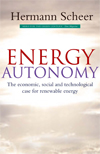 Article published in The Globe And Mail, August 2, 2008 by Chris Turner
Article published in The Globe And Mail, August 2, 2008 by Chris Turner
'Europe's Al Gore' has already revolutionized the energygrid in Germany. Now, Hermann Scheer is challenging Canada to do the same.
These are inarguably booming times for renewable energy across Canada.The Canadian Wind Energy Association is forecasting that 2008 will be a record year for new wind-power installations nationwide. And in just the first five months of the year, the Ontario government approved contracts for new solar-power plants totalling more than 22 megawatts - nearly 90 per cent of what it approved in all of 2007 - under its pacesetting Standard Offer Program.
Yet it's still nowhere near enough and nowhere close to fast enough for Hermann Scheer, probably the most influential renewable-energy lawmaker on the planet.
Speaking recently to an international audience of bureaucrats and business leaders at the seventh World Wind Energy Conference in Kingston, Ont., the German parliamentarian proposed that Canada adopt a radically decentralized electricity system, powered primarily by wind turbines and hydroelectric plants. The effect, he said, could be the elimination of fossil fuels from electricity generation inside a decade.
Mr. Scheer used Ontario as his case in point, noting that the approximately 20,000 megawatts of its electricity currently drawn from non-renewable coal and nuclear plants was about equal to the amount of generating capacity that smaller and much more crowded Germany had added in wind power alone in the past 10 years. "Where is the problem?" he asked. "The problem is in the mind."
In his Kingston speech, Mr. Scheer anticipated the most obvious criticism of his proposal - that it sounds wildly unrealistic. "We have to come to a general replacement of the conventional energy system in the next three to four decades, " he explained.
"That means we have to begin everywhere radically, really radically. And all who say that this would not be realistic have a rotten understanding of realism, because the most important criteria for realism is to have an adequate answer to the real problem."
Changing minds about renewable energy has become the central focus of Hermann Scheer's increasingly influential political career. Although he is little known beyond hard-core green circles on this side of the Atlantic, his position in Europe is roughly equivalent to Al Gore's. His first renewable energy policy, passed in 1998, called on Germany to tile 100,000 roofs in solar panels; his fellow parliamentarians called it "more radical than Greenpeace," but it was implemented within four years and his policy initiatives have since become models for legislators worldwide.
Mr. Scheer argues that only renewable energy can power a clean, emissions- free future, and he dismisses criticisms of it as the self-interested distortions of the conventional energy industry, which will be the only real "loser" in a radically decentralized, renewably powered industry.
He is also critical of the Kyoto Protocol, which, he says, treats climate change only as an economic burden and not as an opportunity.
Mr. Scheer is a recipient of the Right Livelihood Award (sometimes called the "alternative Nobel") and the chair of numerous international energy and environmental organizations. A former economics professor and later a systems analyst at the German Nuclear Research Centre, he was first elected to parliament in 1980, representing the left-leaning Social Democrats. He was a key member of the "Red-Green" coalition that governed Germany from 1998 to 2007 and the architect of Europe's most ambitious renewable energy policy, a "feed- in tariff" that has vaulted Germany into the global lead in wind- and solar- power production and put the country on course to draw 30 per cent of its electricity from renewable sources by 2030.
Germany's Renewable Energy Sources Act - sometimes referred to as "Scheer's law" - obliges electricity distributors to buy power from renewable sources at up to seven times market rates, with the scale of the subsidy varying according to power source and declining gradually over the 20-year life of the tariff. By thus guaranteeing a robust market for renewables, Scheer's law has unleashed the most dramatic green-power boom the world has seen.
In addition to adding more than 20,000 megawatts of emissions-free energy to the nation's grid, the feed-in tariff has transformed Germany's renewable-power business into an industrial behemoth. It now generates about $240-billion in annual revenues and employs a quarter-million Germans. Germany's wind industry created 8,000 jobs in 2007 alone, and one recent study suggested that the renewable sector could provide more work than the auto industry (currently the nation's biggest employer) by 2020.
Scheer's law has inspired the creation or augmentation of similar legislation from Spain to Brazil and from China to California - including Ontario's less aggressive Standard Offer Program.
"The only chance for the future," he told me by phone a few weeks before his Kingston speech, "is to have a second big industrial revolution." He is keenly aware of the daunting scale of this change. "This is much more - much more - than only the exchange of technology. This is a change of the whole energy economy, [and] automatically there is [also] a change in the industrial development. It is a change in the cultural development. It is a change of international relations. Automatically. It is a change of financing structures, a change of the world finance system."
He rattled off the two most common criticisms of renewables - that they are too expensive and would take too long to deploy at such a scale - and noted that the exact opposite has been the case in Germany since the passage of the feed-in tariff. Conventional energy costs have only gone up while the cost of renewables has decreased dramatically, and Germany has installed 22,000 megawatts of wind power - the equivalent of about one-fifth of Canada's entire installed power-generating capacity - in less time than it can take to build a single nuclear plant.
The surcharge on the average German consumer's power bill, Mr. Scheer asserted, has been 24 euros (about $38) a year. "It is the most successful new- job-creation program we ever had, and the most cost-effective job-creation program," he said. "The most effective climate-protection program - it is cheaper than [any] emission-trading concept."
Such details are not well known in Canada, Mr. Scheer suggests, because they pose a direct challenge to the vested interests of the conventional energy industry. "The change to renewables," he explained, "is a change from commercial primary energies to non-commercial primary energies."
Much of the profit in the conventional energy industry lies in commercializing these primary energy sources - mining the coal, drilling the oil and gas. But when primary sources are limitless and entirely free of cost - as they are in the case of the wind, the sun and the heat trapped beneath the Earth's surface - the world of economic might and political influence becomes reordered.
"There are too many links between [energy companies] and the government, and this is a barrier for adequate renewable energy legislation," Mr. Scheer said. "And the only [ones] who can overcome this are the legislation chambers themselves. This is a question of political will and political strategy - only that."



